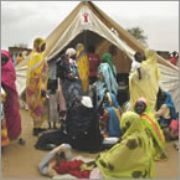Sudan delays expulsion of British aid agency heads
By Opheera McDoom
KHARTOUM, Nov 29 (Reuters) – Sudan has decided to postpone a decision to expel the country heads of two British aid agencies, citing administrative difficulties and humanitarian grounds, the state minister for humanitarian affairs has said.

|
|
Save the Children’s Supplementary Feeding Center in Tewila, North Darfur. |
Mohamed Yousif Abdalla said the decision to expel the country heads of Save the Children and Oxfam for breaches of Sudanese law had been delayed until after he returned from a trip to Europe in four or five days.
“We will postpone it until I come back,” Abdalla told Reuters. “This is an administrative decision which we did not realize all the implications of.”
But he said the organisations were still on notice for what the ministry had said was interfering in political issues, forbidden by Sudanese law governing emergency aid agencies working in Sudan.
“The government of Sudan has made it clear that they have to work on the basis on humanitarian grounds and not to take sides,” he said.
Oxfam has been working throughout north Sudan for 20 years and on Saturday the influential governor of North Darfur state praised the agency’s work in the country.
Save the Children is one of the largest food distributors in Darfur, which the United Nations has called one of the world’s worst humanitarian crises, providing food to more than 300,000 of the almost 2 million people in need of aid.
Save the Children confirmed it had received two letters from the ministry on Monday morning, expelling their country director Kate Halff and officially warning the organisation.
Oxfam said it received a letter of warning, suggesting their country director might be expelled. But sources in the aid community said Oxfam’s country head had also been told to leave the country within 48 hours.
A ministry statement said Save the Children had broken Sudanese law by issuing a press release saying a government plane had dropped a bomb close to one of its feeding centres last week in Tawilla town, North Darfur, without waiting for confirmation from African Union ceasefire monitors.
It also rejected a statement from Oxfam criticising a U.N. Security Council resolution issued in Nairobi earlier this month which contained weaker wording on the possibility of sanctions against Sudan than previous resolutions.
The Humanitarian Affairs Ministry said the organisations should not deal with security issues through the media and said they should instead liaise with the government.
It said it saw all these statements as indications of support for the rebels eager to continue the war in Darfur.
Abdalla said for humanitarian grounds the government would not expel Halff, because she was married to a Sudanese man and had Sudanese children. He added the decision to expel Oxfam had been postponed for administrative reasons.
The British ambassador to Sudan and the United Nations had been pressing Khartoum to reverse the decisions.
A Western diplomat told Reuters the delay was a face-saving gesture.
“The whole idea is that there will be a delay and then it will disappear,” the diplomat said.
After years of tribal clashes over diminishing land and water resources in arid Darfur, rebels took up arms early last year accusing Khartoum of neglect and of arming Arab militia, known as the Janjaweed, to loot and burn non-Arab villages.
The African Union is monitoring a ceasefire signed between two main Darfur rebel groups and the government in April.
